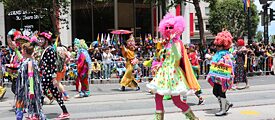 Grafik: TomVonier.online
In Europe and North America, a continuous strengthening of the gay and lesbian, and later queer, emancipation movements marked the decades after the Stonewall Riots in the summer of 1969. Queer issues became popular, gender studies established.
Grafik: TomVonier.online
In Europe and North America, a continuous strengthening of the gay and lesbian, and later queer, emancipation movements marked the decades after the Stonewall Riots in the summer of 1969. Queer issues became popular, gender studies established.
Until recently, the achievements of the struggle for equal rights seemed irreversible. Queer lifestyles appeared to have reached mainstream society. Militant tones only emanated from the supposed margins of the formerly marginalized group(s). But with neo-conservative forces on the rise around the world and manifesting themselves in rightwing populist movements, homophobic and transphobic views are becoming socially acceptable once again and equal rights are increasingly being challenged.
Are there any meaningful and contemporary ways to resist this development? Which experiences of gender-related resistance within and outside our German-American cultural sphere can we draw from at a global level? What can we learn from the history of the past 50 years?
In partnership with:
Four exhibition venues, four panel discussions, four themes: parallel to the exhibition, there will be panel discussions in Toronto, New York, Mexico City, and Berlin. Between June and September 2019, various aspects of current queer discourse will be deliberated under the banner Queer Commonalities – Queer Conflicts: queer resistance, queer culture, queer diversity, and queer establishment. Discussions will take place in English with participants from the US, Canada, Mexico, and Germany. For those unable to attend in person, recordings of the four panels will be made available on this website.








